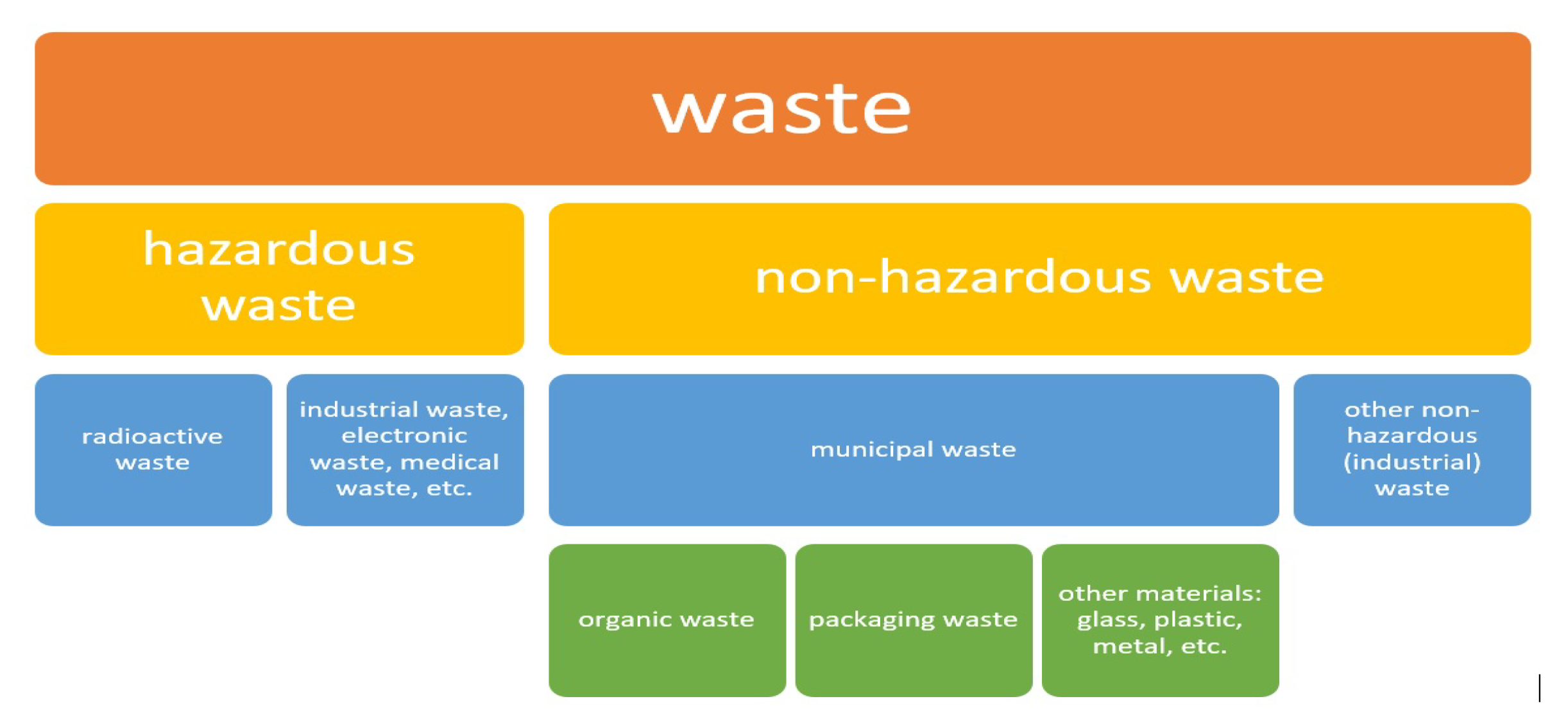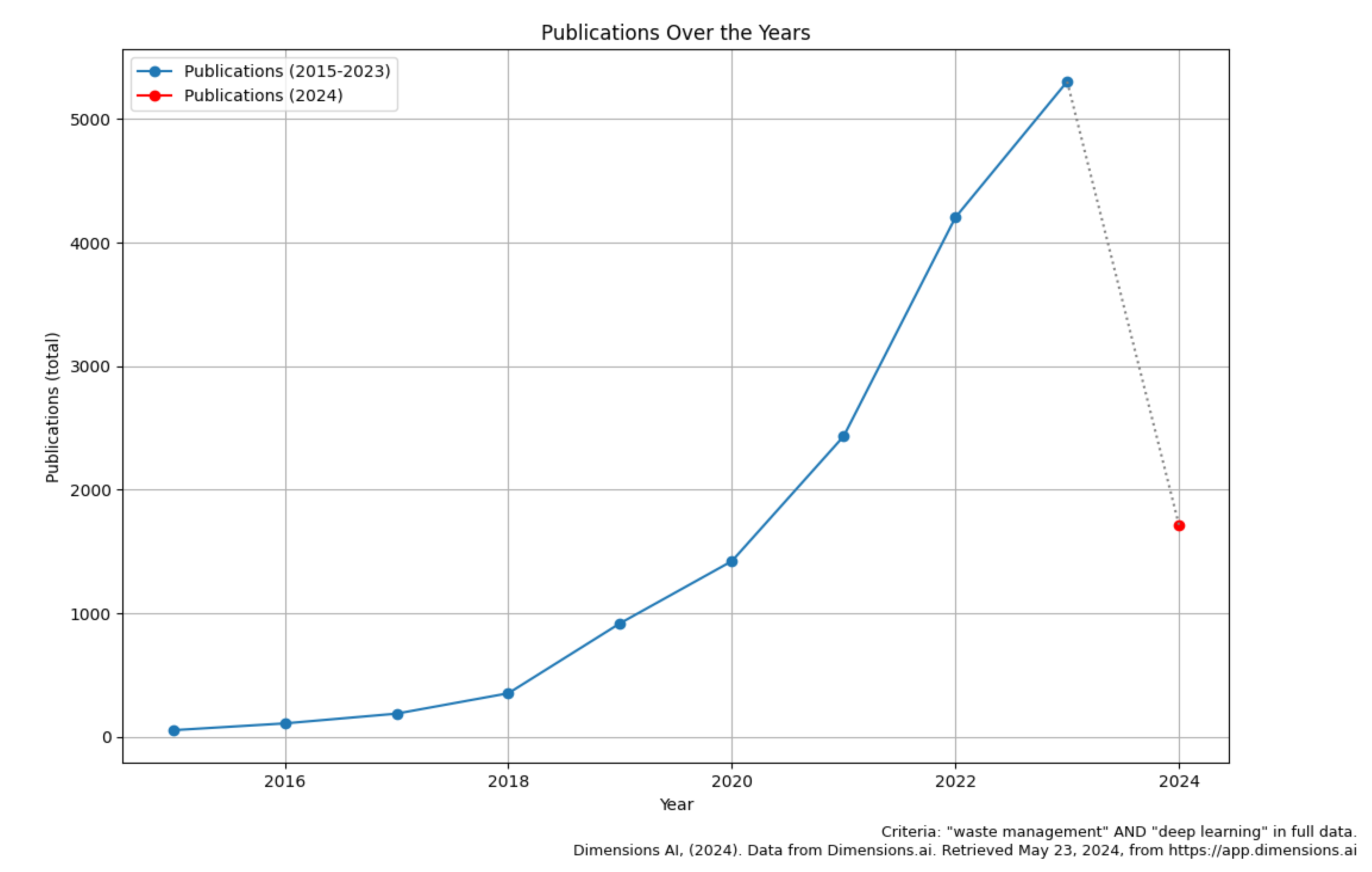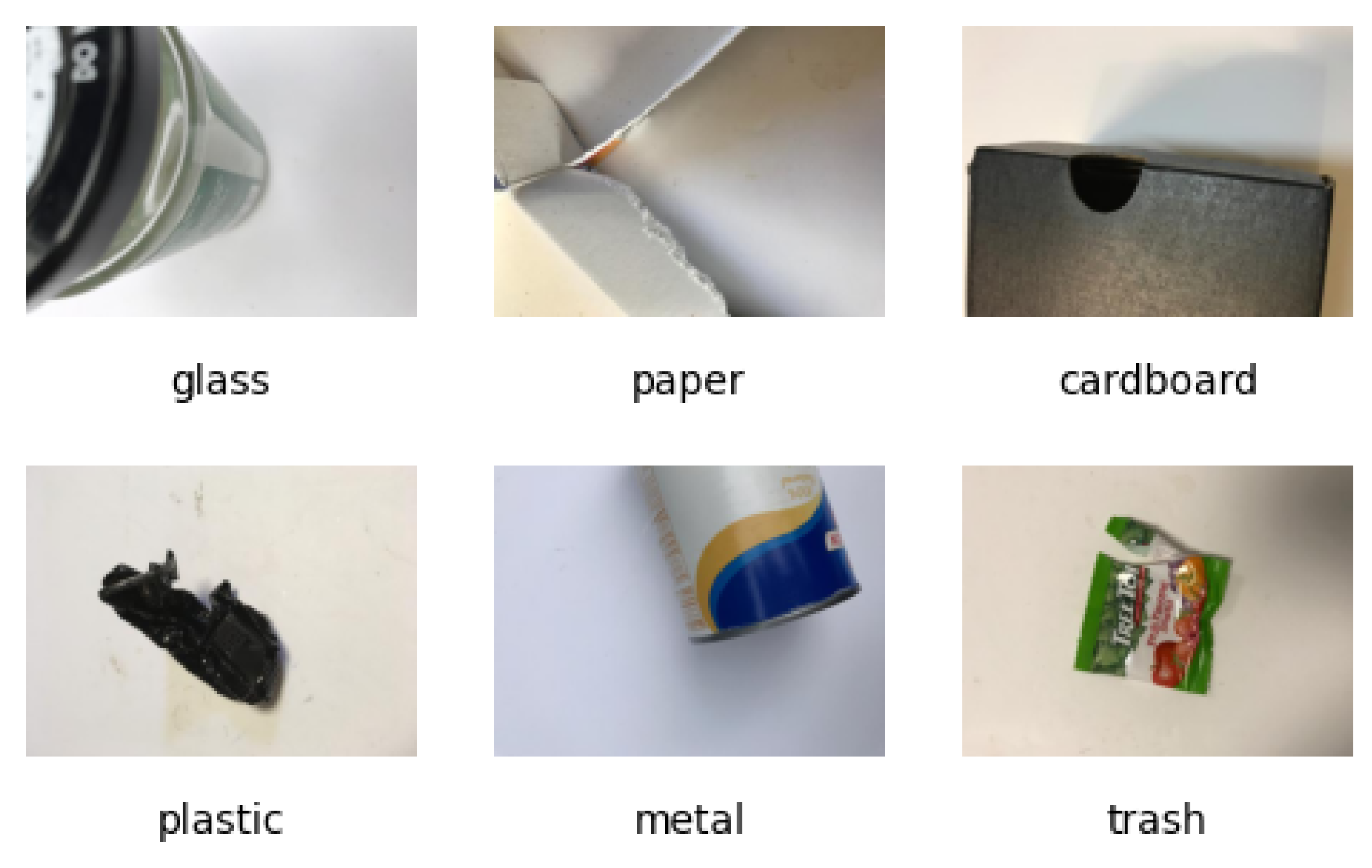Submitted:
06 July 2024
Posted:
09 July 2024
You are already at the latest version
Abstract
Keywords:
1. Introduction
- RQ.1: What techniques have been used for waste management using deep learning?
- RQ.2: What kind of data or dataset have been used to carry out this process?
- RQ.3: What are the different challenges found in this work?
2. Waste Datasets
- A.
-
TACO [20]1500 images with annotations for 28 waste categories and 60 sub-categories in COCO-json format, focusing on waste found in the wild. Available for download from the TACO dataset website. Figure 3 shows cropped annotated images from TACO dataset.
- B.
-
TrashCan 1.0 [10]7212 images categorized into bio (marine animals), trash (marine debris), ROV (man-made items), and unknown, with instance-segmentation labels. Available for download from the University of Minnesota’s website.
- C.
-
Trash-ICRA19 [19]7684 images with labeled objects in plastic, bio, and ROV categories, designed for underwater trash detection. Available from the University of Minnesota repository.
- D.
-
UAVVaste [21]772 drone-captured images with 3716 annotations for rubbish detection and segmentation, available for download from GitHub.
- E.
-
Trashnet [12]2527 images across six classes (glass, paper, cardboard, plastic, metal, and trash) aimed at classifying trash for recyclability, accessible via GitHub. Figure 4 shows sample images of each class of Trashnet dataset.
- F.
-
Plastic Waste DataBase of Images – WaDaBa [22]4000 images of plastic items, detailed by type, color, deformation, and dirtiness, available for download from their website. Annotations require signing a license agreement.
- G.
-
Waste Classification data [23]Provides over 25k images divided into training and test sets, categorized as organic and recyclable. Available for download from Kaggle.
- H.
-
Waste Classification Data v2 [24]An extension of the Waste Classification data, including an additional category for nonrecyclable waste, with over 25k images available for download from Kaggle.
- I.
-
Waste Images from Sushi Restaurant [25]Contains 500 waste images categorized into 16 classes from sushi restaurant and can be downloaded from Kaggle.
- J.
-
Open litter map [26]Contains over 100k images categorized into 11 main and 187 subcategories, accessible using a JSON scraper from the provided GitHub link.
- K.
-
Drinking Waste Classification [27]Includes around 10k images in four classes: aluminium cans, glass bottles, PET bottles, and HDPE milk bottles, available for download from Kaggle.
- L.
-
Waste pictures [28]Contains around 24k images divided into 34 waste classes, intended for classification purposes, available on Kaggle.
- M.
-
Spot Garbage - GINI dataset [30]Consists of 2561 images with 1496 annotated by bounding boxes, sourced using the Bing Image Search API, available for download from GitHub.
- N.
-
DeepSea Waste [29]Includes around 3k underwater images categorized and annotated with details such as location, depth, and the presence of living organisms, available for download from Kaggle.
- O.
-
MJU-Waste v1.0 [31]Features 2475 RGB and depth image pairs of waste items, annotated in PASCAL VOC and COCO formats, available for download from a Google Drive link on their GitHub page.
- P.
-
Cigarette butt dataset [32]A synthetic dataset of 2200 images of cigarette butts on the ground, designed for CNN training, available after accepting a non-commercial license agreement from the provider’s website.
- Q.
-
TrashBox dataset [33]It contains images of trash objects across seven categories, sourced from the web and available for download from a GitHub repository.
- R.
-
PlastOPol: A Dataset for Litter Detection [34]Consists of 2418 images with bounding box annotations for litter, collected by the Marine Debris Tracker, available for download from Zenodo.
- S.
-
Garbage Dataset [35]Comprises images of waste grouped into ten classes, collected from various sources and the D.Waste app, available for download from Kaggle. Some of sample images of this dataset is shown in Figure 5.
- T.
-
Waste Classification Dataset [36]Contains a number of images of household waste categorized as organic and recyclable, a modified version of a previous dataset used in a UK research study.
- U.
-
BeachLitter dataset [37]Includes 3500 images with segmentation masks, categorized into eight classes from coastal surveys in Japan, accessible for research purposes.
3. Waste Management Using Deep Learning
4. Challenges in Waste Management
- A.
-
Lack of Annotations and Insufficient Data
- B.
-
Data Quality IssuesProblems with non-image files, duplicates, and irrelevant images within datasets can degrade model performance [38].
- C.
-
Complexity and Variability
- Complexity of Waste Types: The variety of waste types and their appearance and context make classification complicated [14].
- Visual Indistinguishability: Some waste items, such as plastic bottles and glass bottles, may be visually indistinguishable [20].
- Context-Dependent Classification: The same object may be classified differently based on its context (e.g., a drink bottle on a desk vs. in the forest) [38].
- D.
-
Image Quality and PreprocessingChallenges include variations in image sizes and quality, requiring extensive preprocessing such as resizing, normalizing, and augmenting data [43]. Additionally, images often contain multiple categories of waste, complicating classification, and different lighting conditions can alter object visibility and appearance, complicating detection.
- E.
-
Computational and Model EfficiencyThe need for efficient, scalable models due to high computational costs, and training time and detection accuracy issues due to very small bounding-box annotations [39].
- F.
-
Object Size and LocalizationObjects that are too small, too distant, or in low visibility conditions may not be recognizable, and there may be difficulty in predicting the exact location of the object within images, leading to problems in object detection and identification [47].
- G.
-
Occlusion and Trash in the WildSome objects are partially or fully hidden by other objects, leading to low recognition accuracy.
- H.
-
RegulationHigh initial costs and outdated regulatory frameworks hinder the adoption of DL in waste management. Companies struggle to comply with regulations while integrating new DL solutions, necessitating updated guidelines to ensure safe and effective implementation.
- I.
-
Environmental ImpactDL’s potential to optimize waste reduction and recycling is impeded by poor data quality and integration complexities. Inconsistent data undermines the accuracy of DL models, while integrating DL with existing infrastructure poses challenges, delaying environmental benefits like improved pollution monitoring.
- J.
-
Industry AdoptionThe high cost and technical challenges associated with DL implementation hinder industry adoption [57]. Integrating DL into workflows requires substantial changes and skilled personnel, posing additional barriers to adoption. Addressing these challenges demands collaborative efforts to streamline integration and reduce barriers to entry.
5. Conclusion
References
- Mihai, F.C.; Gündoğdu, S.; Markley, L.A.; Olivelli, A.; Khan, F.R.; Gwinnett, C.; Gutberlet, J.; Reyna-Bensusan, N.; Llanquileo-Melgarejo, P.; Meidiana, C.; Elagroudy, S.; Ishchenko, V.; Penney, S.; Lenkiewicz, Z.; Molinos-Senante, M. Plastic pollution, waste management issues, and circular economy opportunities in rural communities. Sustainability 2021, 14, 20. [Google Scholar] [CrossRef]
- Alves, B. Global waste generation - statistics & facts, 2023.
- Czekała, W.; Drozdowski, J.; Łabiak, P. Modern technologies for waste management: a review. Applied Sciences 2023, 13, 8847. [Google Scholar] [CrossRef]
- 1.1. Definition and classification of waste – MOOC: Auditing waste management, 2022.
- Shahab, S.; Anjum, M.; Umar, M.S. Deep learning applications in solid waste management: a deep literature review. International Journal of Advanced Computer Science and Applications (IJACSA) 2022, 13. [Google Scholar] [CrossRef]
- Ahmed, S.; Mubarak, S.; Du, J.T.; Wibowo, S. Forecasting the status of municipal waste in smart bins using deep learning. International Journal of Environmental Research and Public Health 2022, 19, 16798. [Google Scholar] [CrossRef] [PubMed]
- Jadli, A.; Hain, M. Toward a deep smart waste management system based on pattern recognition and transfer learning. 2020 3rd International Conference on Advanced Communication Technologies and Networking (CommNet); IEEE: Marrakech, Morocco, 2020; pp. 1–5. [Google Scholar] [CrossRef]
- Gunaseelan, J.; Sundaram, S.; Mariyappan, B. A design and implementation using an innovative deep-learning algorithm for garbage segregation. Sensors 2023, 23, 7963. [Google Scholar] [CrossRef] [PubMed]
- Dimensions AI | The most advanced scientific research database, 2024.
- Hong, J.; Fulton, M.; Sattar, J. Trashcan: a semantically-segmented dataset towards visual detection of marine debris 2020. [CrossRef]
- Majchrowska, S.; Mikołajczyk, A.; Ferlin, M.; Klawikowska, Z.; Plantykow, M.A.; Kwasigroch, A.; Majek, K. Deep learning-based waste detection in natural and urban environments. Waste Management 2022, 138, 274–284. [Google Scholar] [CrossRef] [PubMed]
- Yang, M.; Thung, G. Classification of Trash for Recyclability Status. CS229 2016. [Google Scholar]
- Mounadel, A.; Ech-Cheikh, H.; Lissane Elhaq, S.; Rachid, A.; Sadik, M.; Abdellaoui, B. Application of artificial intelligence techniques in municipal solid waste management: a systematic literature review. Environmental Technology Reviews 2023, 12, 316–336. [Google Scholar] [CrossRef]
- Abdu, H.; Mohd Noor, M.H. A survey on waste detection and classification using deep learning. IEEE Access 2022, 10, 128151–128165. [Google Scholar] [CrossRef]
- Anjum, M.; Umar, M.S.; Shahab, S. Systematic literature review of deep learning models in solid waste management; , 2022; p. 02 0008. [CrossRef]
- Xia, W.; Jiang, Y.; Chen, X.; Zhao, R. Application of machine learning algorithms in municipal solid waste management: A mini review. Waste Management & Research: The Journal for a Sustainable Circular Economy 2022, 40, 609–624. [Google Scholar] [CrossRef]
- Namoun, A.; Tufail, A.; Khan, M.Y.; Alrehaili, A.; Syed, T.A.; BenRhouma, O. Solid waste generation and disposal using machine learning approaches: a survey of solutions and challenges. Sustainability 2022, 14, 13578. [Google Scholar] [CrossRef]
- Arthur, M.P.; Shoba, S.; Pandey, A. A survey of smart dustbin systems using the IoT and deep learning. Artificial Intelligence Review 2024, 57, 56. [Google Scholar] [CrossRef]
- Fulton, M.; Hong, J.; Islam, M.J.; Sattar, J. Robotic detection of marine litter using deep visual detection models 2018. [CrossRef]
- Proença, P.F.; Simões, P. Taco: trash annotations in context for litter detection 2020. [CrossRef]
- Kraft, M.; Piechocki, M.; Ptak, B.; Walas, K. Autonomous, onboard vision-based trash and litter detection in low altitude aerial images collected by an unmanned aerial vehicle. Remote Sensing 2021, 13, 965. [Google Scholar] [CrossRef]
- Bobulski, J.; Piatkowski, J. Pet waste classification method and plastic waste database - wadaba. In Image Processing and Communications Challenges 9; Choraś, M., Choraś, R.S., Eds.; Springer International Publishing: Cham, 2018; Vol.681,pp.57–64. [Google Scholar] [CrossRef]
- Sekar, S. Waste Classification data, 2019.
- Sapal. Waste classification data v2, 2019.
- Cen, A. Waste images from sushi restaurant, 2020.
- Lynch, S. Openlittermap. Com – open data on plastic pollution with blockchain rewards(Littercoin). Open Geospatial Data, Software and Standards 2018, 3, 6. [Google Scholar] [CrossRef]
- Serezhkin, A. Drinking waste classification, 2020.
- Waste pictures, 2019.
- Haefliger, H. Deepseawaste, 2020.
- Mittal, G.; Yagnik, K.B.; Garg, M.; Krishnan, N.C. SpotGarbage: smartphone app to detect garbage using deep learning. Proceedings of the 2016 ACM International Joint Conference on Pervasive and Ubiquitous Computing; ACM: Heidelberg Germany, 2016; pp. 940–945. [Google Scholar] [CrossRef]
- Wang, T.; Cai, Y.; Liang, L.; Ye, D. A multi-level approach to waste object segmentation. Sensors 2020, 20, 3816. [Google Scholar] [CrossRef] [PubMed]
- Kelly, A. Cigarette butt dataset.
- Kumsetty, N.V.; Bhat Nekkare, A. ; S., S.K.; Kumar M., A. Trashbox: trash detection and classification using quantum transfer learning. 2022 31st Conference of Open Innovations Association (FRUCT); IEEE: Helsinki, Finland, 2022; pp. 125–130. [Google Scholar] [CrossRef]
- Córdova, M.; Pinto, A.; Hellevik, C.C.; Alaliyat, S.A.A.; Hameed, I.A.; Pedrini, H.; Torres, R.d.S. Plastopol: a dataset for litter detection, 2022. [CrossRef]
- Kunwar, S. Garbage dataset, 2023. [CrossRef]
- Nonso Nnamoko. Waste classification dataset, 2023. [CrossRef]
- Sugiyama, D.; Hidaka, M.; Matsuoka, D.; Murakami, K.; Kako, S. The BeachLitter dataset for image segmentation of beach litter. Data in Brief 2022, 42, 108072. [Google Scholar] [CrossRef]
- Carolis, B.D.; Ladogana, F.; Macchiarulo, N. Yolo trashnet: garbage detection in video streams. 2020 IEEE Conference on Evolving and Adaptive Intelligent Systems (EAIS); IEEE: Bari, Italy, 2020; pp. 1–7. [Google Scholar] [CrossRef]
- Ping, P.; Xu, G.; Kumala, E.; Gao, J. Smart street litter detection and classification based on faster r-cnn and edge computing. International Journal of Software Engineering and Knowledge Engineering 2020, 30, 537–553. [Google Scholar] [CrossRef]
- Kunwar, S. Managing household waste through transfer learning. Industrial and Domestic Waste Management 2024, 4, 14–22. [Google Scholar] [CrossRef]
- Cowger, W.; Hollingsworth, S.; Fey, D.; Norris, M.C.; Yu, W.; Kerge, K.; Haamer, K.; Durante, G.; Hernandez, B. Trash ai: a web gui for serverless computer vision analysis of images of trash. Journal of Open Source Software 2023, 8, 5136. [Google Scholar] [CrossRef]
- Poudel, S.; Poudyal, P. Classification of waste materials using cnn based on transfer learning. Proceedings of the 14th Annual Meeting of the Forum for Information Retrieval Evaluation; ACM: Kolkata India, 2022; pp. 29–33. [Google Scholar] [CrossRef]
- Zhou, H.; Yu, X.; Alhaskawi, A.; Dong, Y.; Wang, Z.; Jin, Q.; Hu, X.; Liu, Z.; Kota, V.G.; Abdulla, M.H.A.H.; Ezzi, S.H.A.; Qi, B.; Li, J.; Wang, B.; Fang, J.; Lu, H. A deep learning approach for medical waste classification. Scientific Reports 2022, 12, 2159. [Google Scholar] [CrossRef] [PubMed]
- Yang, Z.; Bao, Y.; Liu, Y.; Zhao, Q.; Zheng, H.; Bao, Y. Research on deep learning garbage classification system based on fusion of image classification and object detection classification. Mathematical Biosciences and Engineering 2023, 20, 4741–4759. [Google Scholar] [CrossRef] [PubMed]
- Jin, S.; Yang, Z.; Królczykg, G.; Liu, X.; Gardoni, P.; Li, Z. Garbage detection and classification using a new deep learning-based machine vision system as a tool for sustainable waste recycling. Waste Management 2023, 162, 123–130. [Google Scholar] [CrossRef] [PubMed]
- Al-Mashhadani, I.B. Waste material classification using performance evaluation of deep learning models. Journal of Intelligent Systems 2023, 32, 20230064. [Google Scholar] [CrossRef]
- Sai Susanth, G.; Jenila Livingston, L.M.; Agnel Livingston, L.G.X. Garbage waste segregation using deep learning techniques. IOP Conference Series: Materials Science and Engineering 2021, 1012, 012040. [Google Scholar] [CrossRef]
- Meron, D.; Tagel, A.; Bisrat, D. Deep learning-based object detection for smart solid waste management system. Annals of Environmental Science and Toxicology 2023, 7, 052–060. [Google Scholar] [CrossRef]
- Ahmed, M.I.B.; Alotaibi, R.B.; Al-Qahtani, R.A.; Al-Qahtani, R.S.; Al-Hetela, S.S.; Al-Matar, K.A.; Al-Saqer, N.K.; Rahman, A.; Saraireh, L.; Youldash, M.; Krishnasamy, G. Deep learning approach to recyclable products classification: towards sustainable waste management. Sustainability 2023, 15, 11138. [Google Scholar] [CrossRef]
- Lun, Z.; Pan, Y.; Wang, S.; Abbas, Z.; Islam, M.S.; Yin, S. Skip-yolo: domestic garbage detection using deep learning method in complex multi-scenes. International Journal of Computational Intelligence Systems 2023, 16, 139. [Google Scholar] [CrossRef]
- Verma, V.; Gupta, D.; Gupta, S.; Uppal, M.; Anand, D.; Ortega-Mansilla, A.; Alharithi, F.S.; Almotiri, J.; Goyal, N. A deep learning-based intelligent garbage detection system using an unmanned aerial vehicle. Symmetry 2022, 14, 960. [Google Scholar] [CrossRef]
- Sürücü, S.; Ecemiş, I.N. Classification of urban waste materials with deep learning architectures. SN Computer Science 2023, 4, 285. [Google Scholar] [CrossRef]
- Kunwar, S. Mwaste: a deep learning approach to manage household waste 2023. [CrossRef]
- Kaya, V. Classification of waste materials with a smart garbage system for sustainable development: a novel model. Frontiers in Environmental Science 2023, 11, 1228732. [Google Scholar] [CrossRef]
- Sayed, G.I.; Abd Elfattah, M.; Darwish, A.; Hassanien, A.E. Intelligent and sustainable waste classification model based on multi-objective beluga whale optimization and deep learning. Environmental Science and Pollution Research 2024, 31, 31492–31510. [Google Scholar] [CrossRef] [PubMed]
- Molina, M.; Ribeiro, R.P.; Veloso, B.; Gama, J. Super-resolution analysis for landfill waste classification 2024. [CrossRef]
- Rjab, A.B.; Mellouli, S.; Corbett, J. Barriers to artificial intelligence adoption in smart cities: A systematic literature review and research agenda. Government Information Quarterly 2023, 40, 101814. [Google Scholar] [CrossRef]





| Survey Papers | Comments | Limitations | Recommendations |
|---|---|---|---|
| Abdu et al. [14] | Provides a comprehensive review of deep learning applications in waste detection and classification, covering image classification and object detection models. | High computational cost, need for large annotated datasets, complexity of waste types, variability in waste appearance and context. | Improve model accuracy, create more comprehensive datasets, develop real-time detection systems, focus on efficient and scalable models. |
| Anjum et al. [15] | Comprehensive review of 25 studies on deep learning in solid waste management (SWM) from 2019-2021. Discusses applications in waste identification, segregation, real-time bin level detection, and waste generation prediction. | All studies used self-constructed datasets, indicating no benchmark datasets exist. This makes it difficult to compare model performances. | Construct annotated benchmark datasets for each waste category. Highlighted that deep learning models provide effective and efficient solutions for various SWM problems. |
| Shahab et al. [5] | Systematic review of 40 studies on DL in SWM, covering applications like waste identification, segregation, and prediction of waste generation | Lack of comprehensive studies evaluating DL potential in SWM, limited geographical representation of studies, and variability in data quality and methodologies | More focused research on unexplored DL applications in SWM, standardization in data collection and processing, collaboration across disciplines for holistic solutions. |
| Xia et al. [16] | Reviewed 226 studies on ML applications in MSWM, highlighting the comprehensive use of ML from waste generation to final disposal. Emphasizes the increasing interest in the field and the broad use of various ML algorithms such as ANN, SVM, RF, and DL | Complexity of MSWM systems necessitates long-term research for mature applications;Most studies are exploratory and lack practical applications;Difficulty in interpreting complex ML models (considered black boxes) | Enhance model interpretability to aid decision-making and policy formulation, Promote practical applications such as intelligent garbage identification and classification, Continue exploring the integration of ML in all stages of MSWM, including waste prediction, route optimization, and pollutant monitoring. |
| Namoun et al. [17] | Systematic review of 42 articles on ML in waste management from 2010 to 2021, focusing on waste generation and disposal. Emphasizes the potential of ML for predicting waste generation patterns and optimizing waste management processes | Scarcity of real-time time series waste datasets, Lack of performance benchmarking tests, Reliability issues of analytics models, Long-term forecasting challenges | Develop comprehensive real-time datasets, Standardize performance benchmarking for models, Improve the reliability and transparency of ML models, Enhance long-term waste generation forecasting accuracy |
| Arthur et al. [18] | This paper undertakes a comprehensive analysis of smart dustbin systems, highlighting the use of IoT, deep learning, and computer vision to improve waste management. It discusses various features and technologies implemented in SDS over the years and compares results from existing works. | Limited datasets for garbage types, Inaccuracy in object detection for garbage segregation, High costs and energy consumption of smart bin algorithms, Initial stages of automatic cleaning and sanitization features | Develop comprehensive real-time datasets, Standardize performance benchmarking for models, Improve the reliability and transparency of ML models, Enhance long-term waste generation forecasting accuracy |
| Name | Categories | Images | Annotation |
|---|---|---|---|
| TrashCan 1.0 [10] | 4 | 7,212 | Instance-Segmentation |
| Trash-ICRA19 [19] | 3 | 5,700 | Detection |
| TACO [20] | 28 | 1,500 | Segmentation |
| UAVVaste [21] | 1 | 772 | Segmentation |
| Trashnet [12] | 6 | 2,527 | Classification |
| WaDaBa [22] | 8 | 4,000 | Classification |
| Waste Classification data [23] | 2 | 22,500 | Classification |
| Waste Classification Data v2 [24] | 3 | ∼27,500 | Classification |
| Waste Images from Sushi Restaurant [25] | 16 | 500 | Classification |
| Open litter map [26] | 11 | >100k | Multilabel classification |
| Drinking Waste Classification [27] | 4 | 9,640 | Detection |
| Waste pictures [28] | 34 | ∼24,000 | Classification |
| DeepSeaWaste [29] | 5 | 3,055 | Classification |
| SpotGarbage - GINI dataset [30] | 1 | 2,561 | Detection |
| MJU-Waste v1.0 [31] | 1 | 2,475 | Segmentation |
| Cigarette butt dataset [32] | 1 | 2,200 | Detection |
| TrashBox [33] | 7 | 17,785 | Classification/Detection |
| PlastOPol [34] | 1 | 2,418 | Classification/Detection |
| Garbage Dataset [35] | 10 | 24,342 | Classification |
| Waste Classification Dataset [36] | 2 | 22,500 | Classification |
| BeachLitter Dataset [37] | 8 | 3,500 | Classification/Segmentation |
| Paper | Task | DL Model(s) | Results |
|---|---|---|---|
| Carolis et al. [38], | detection | YOLOv3 | mAP@50 = 59.57% |
| Proença et al. [20], | segmentation | Mask RCNN | 1-class mAP = 15.9% 10-class mAP = 17.6% |
| Wang et al. [31] | segmentation | FCN, PSPNet, CCNet, DeepLabv3 | TACO mPP = 96.07% MJU-Waste mPP = 97.14% |
| Hong et al. [10], | segmentation, detection | Mask RCNN, Faster RCNN | Faster RCNN mAP = 34.5 Mask RCNN mAP = 30.0 |
| Ping et al. [39] | detection, classification | Faster RCNN | 11-class mAP = 24% |
| Kunwar [40] | classification | EfficientNetV2M, EfficientNetV2S, MobileNet, ResNet50, ResNet101 | EfficientNetV2M Acc = 96.37% |
| Cowger et al. [41] | detection | YOLO v5 | - |
| Poudel et al. [42] | classification | InceptionV3, InceptionResNetV2, Xception, VGG19, MobileNet, ResNet50, DenseNet201 | DenseNet201 Acc = 95.05% |
| Zhou et al. [43] | detection, classification | Deep MW (ResNeXt followed by TL) | Acc = 97.2% |
| Yang et al. [44] | detection, classification | ResNet, MobileNetV2 (classification), YOLOv5s, YOLOv5m, YOLOv5x (detection) | Acc = 98% |
| Jin et al. [45] | detection, classification | improved MobileNetV2 | Acc = 89.26% |
| Al-Mashhadani [46] | classification | Resnet50, GoogleNet, InceptionV3, and Xception | ResNet50 Acc = 95% |
| Sai Susanth et al. [47] | classification, detection | ResNet50, DenseNet169, VGG16, and AlexNet trained on ImageNet | DenseNet169 Acc = 94.9% |
| Meron et al. [48] | classification, detection | YOLOv4, YOLOv4-tiny | YOLOv4 mAP = 91.25% |
| Ahmed et al. [49] | classification | MobileNetV2, ResNet50V2, DenseNet169, CNN | ResNet50V2 Acc = 98.95% |
| Lun et al. [50] | classification | YOLOv3, Skip-YOLO | Skip-YOLO-0 mAP50 = 90.38% |
| Verma et al. [51] | detection | CNN1, CNN2 | CNN1 Acc = 94% |
| Sürücü et al. [52] | classification | DenseNet121, DenseNet201, MobileNetV2, ResNet50V2, VGG16, Xception | MobileNetV2 Acc = 99.36% |
Disclaimer/Publisher’s Note: The statements, opinions and data contained in all publications are solely those of the individual author(s) and contributor(s) and not of MDPI and/or the editor(s). MDPI and/or the editor(s) disclaim responsibility for any injury to people or property resulting from any ideas, methods, instructions or products referred to in the content. |
© 2024 by the authors. Licensee MDPI, Basel, Switzerland. This article is an open access article distributed under the terms and conditions of the Creative Commons Attribution (CC BY) license (http://creativecommons.org/licenses/by/4.0/).





